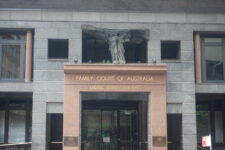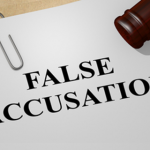Family Court Judges to be Trained About the Malicious Use of False Accusations

New training for Family Court and Federal Circuit Court judges will include information about victims of domestic and family violence whose stories are often not heard: partners who have been falsely accused.
Domestic violence is a serious issue in Australia and, according to statistics, it has risen during COVID.
But a side that is not often widely reported is that false allegations of abuse are made during divorce and separation proceedings.
This occurs when one party, who may be feeling vindictive, tries to turn children against the other parent and makes unsubstantiated claims of violence and even child sexual abuse.
Such claims can be made out of malice and/or to bolster the party’s prospects of securing a favourable outcome – from their own perspective – in family law cases such as custody and property proceedings.
Instances like this have a significant impact on their victims mentally as well as financially, sometimes leading to devastating consequences. And sadly, they are far from uncommon.
Research cited in a report by the Australian Institute of Family Studies suggests that one in five accusations of child sexual abuse may be false, predominantly made out of malice.
The victims of these false allegations are predominantly men, and the children also fall victims due to the trauma caused to their fathers and themselves by the resulting acrimony, as well as by the fact that family law decisions may not be ‘in the interests of the child’ when tainted by false claims.
One former family court judge, Justice David Collier, was so incensed with false claims that he told the media:
”If a husband and wife really get down to it in this day and age, dirt flies”
“The worst are those mothers who direct false allegations of abuse against former partners.”
”When you have heard the evidence, you realise that this is a person who’s so determined to win that he or she will say anything. I’m satisfied that a number of people who have appeared before me have known that it is one of the ways of completely shutting husbands out of the child’s life.”
”It’s a horrible weapon.”
The judge say he would “often lose sleep at night” over cases. He retired after spending 14 years on the bench.
But a new initiative being implemented into the Family Court of Australia and Federal Circuit Court of Australia, aims not only to better inform judges about domestic and family violence, but also about what has been described as the “unprecedented hostility infiltrating the Family Court”.
Safe & Together Model
The Courts have recently engaged the Safe & Together Institute from the USA to deliver court-wide training to judges presiding over family law cases.
The Safe & Together Model is highly regarded world-wide and has been endorsed by many of Australia’s leading family and domestic violence experts.
The model uses a behavioural approach to mapping domestic violence perpetrators’ patterns onto child and family functioning. It aims to “close the gap” between assessment of child abuse and domestic violence, helps to reduce victim-blaming, increases accountability for parents who are using violence and coercive control, and assists judges to better identify parties who may be abusing court process to further their own objectives – at the expense of their children.
By undertaking such training, it is hoped that judges will be much better equipped to understand the drivers behind abusive behaviour. This includes determining, based on relevant evidence presented to the court, whether any allegations of abuse are indeed real, or made up.
This is an incredibly complex issue. To be accused of abuse, a person doesn’t necessarily need to have actually committed a violent act, or any act at all for that matter. In many cases, if the other partner claims to feel threatened or unsafe, or claims to believe the children are unsafe, or is simply trying to get ahead with the proceedings.
There is a significant responsibility on Family Court judges to make the right decisions, for everyone involved, including the children, as well as to protect those who need it and to expose false accusations when they arise.
False complaints are a crime
Section 314 of the Crimes Act 1900 (NSW) makes it an offence punishable by up to seven years’ imprisonment for a person to make an accusation intending for another person to be the subject of an investigation of an offence, knowing that the other person is innocent.
If the complainant testified in court or swore a statement under oath, they may be prosecuted for the offence of perjury under section 327 of the Act, which carries a maximum penalty of 10 years’ imprisonment.
A person is guilty of perjury if it is proven:
- They made a false statement under oath,
- The statement was made in, or in connection with, judicial proceedings,
- The statement concerned a matter which was material to those proceedings, and
- The maker knew the statement was false or did not believe it was true at the time it was made.
The maximum penalty for perjury increases to 14 years where the complainant committed the act with the intention to procure the conviction or acquittal of a person for a ‘serious indictable offence’ – which is one that carries a maximum penalty of at least five years in prison.
The complainant may also be charged with the offence of attempting to pervert the course of justice under section 319 of the Act, the maximum penalty for which is also 14 years’ imprisonment.
Civil proceedings
An additional or alternative avenue of redress is civil proceedings for the damage caused as a result of the false complaint and/or prosecutorial misconduct, such as malicious prosecution or abuse of the court process.
Civil proceedings may be brought against the complainant and/or the State, in the latter case due to misconduct by the government’s prosecutorial agents.
False complaints ruin lives, especially when it comes to sexual offences. Those who make such complaints not cause innocent people to go through hell, they waste public resources, and can also make it more difficult for genuine victims to have their complaints believed and acted upon.
Avoiding conflict
Those who find themselves in an acrimonious separation are well-advised to attempt to avoid conflict, if this can be done.
It is a good idea to keep interactions with an ex-spouse brief, keep a record of conversations and parenting arrangements, and aim to have an adult friend or relative present as a ‘witness’ in situations that may become tense.






